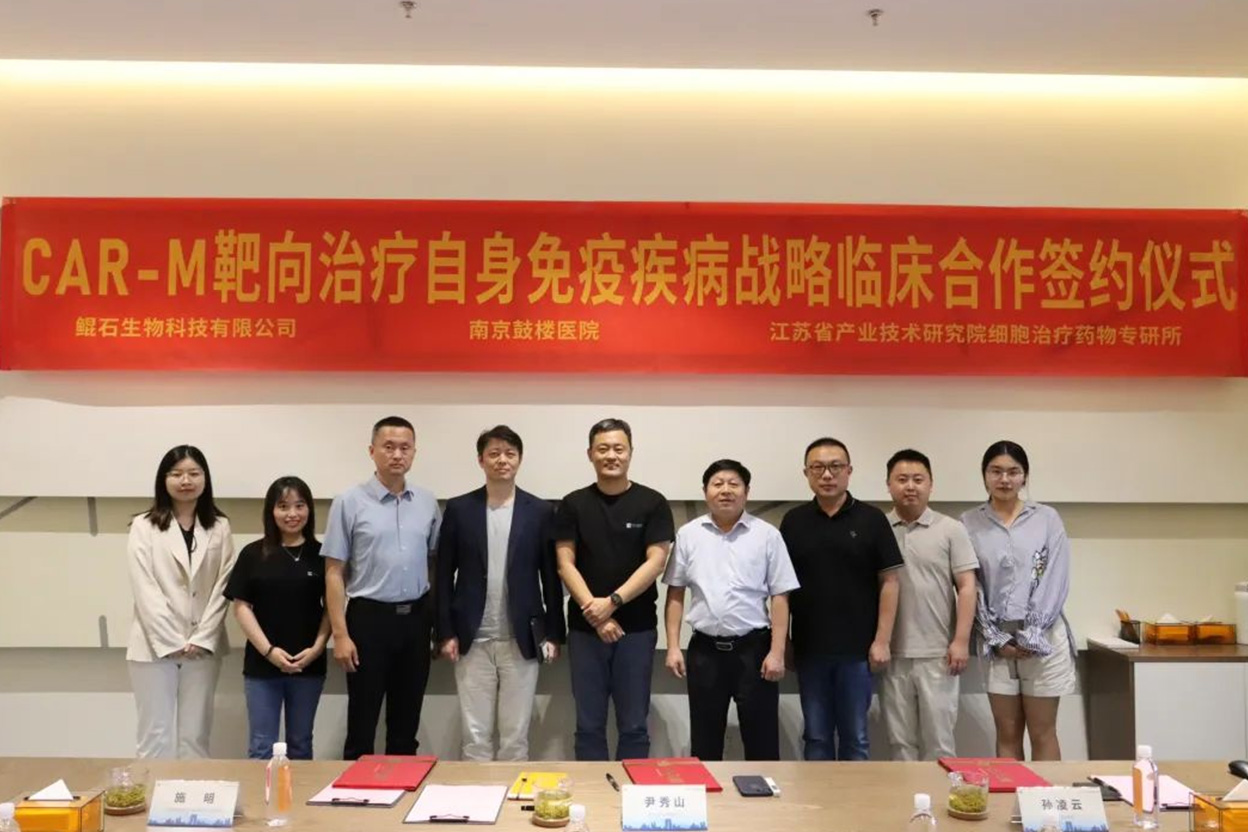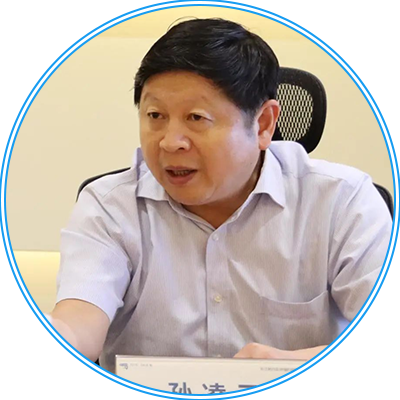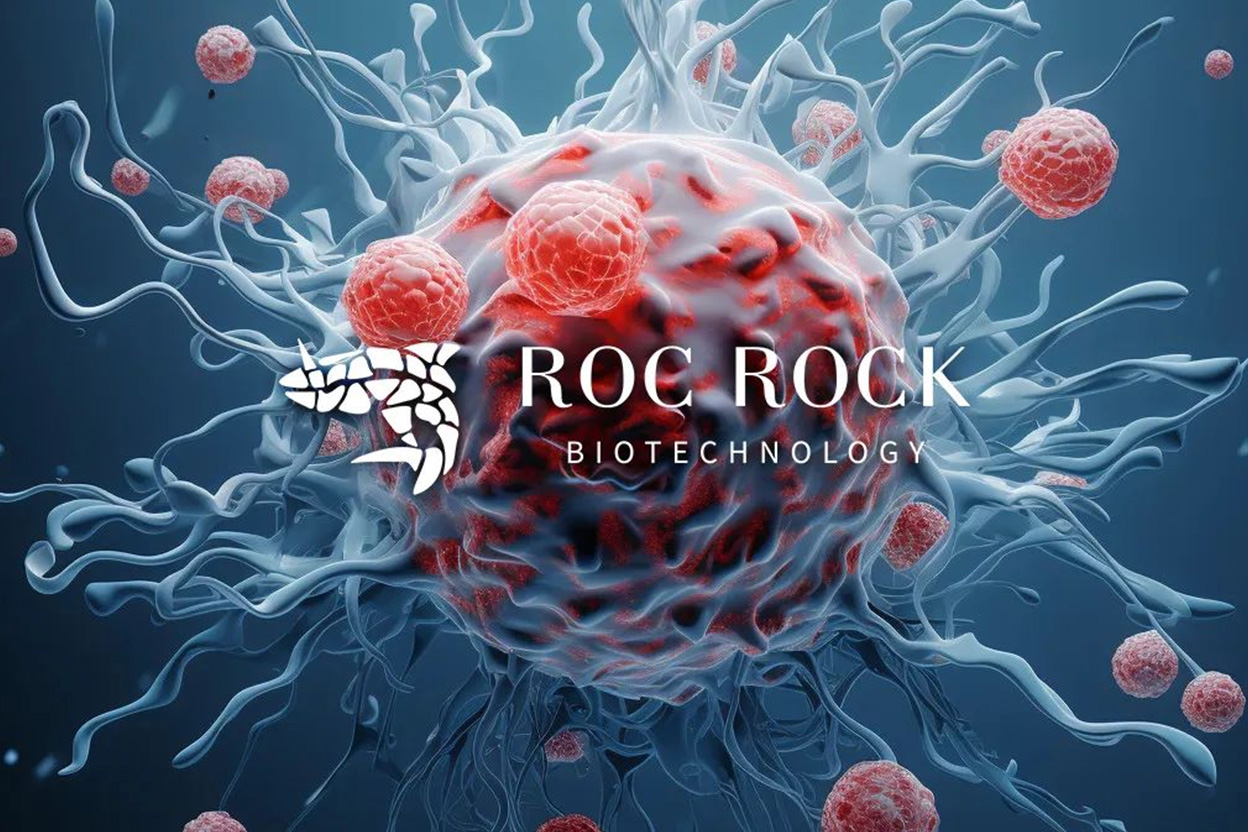0512-67998889(Suzhou)
18051093220(Shenzhen)
September 21, 2023, marked a significant milestone with the signing of a strategic clinical collaboration between RocRock Biotechnology, Nanjing Drum Tower Hospital, and the Cell Therapy Drug Research Institute of Jiangsu Industrial Technology Research Institute. This alliance aims to advance the development of CAR-M therapies targeting autoimmune conditions. Chairman Yin Jianguo of Suzhou Industrial Park Biological Industry Development Co., Ltd., was present to commemorate this historic event. This partnership signifies a groundbreaking foray into the realm of autoimmune disease treatment using macrophage medicines, offering a new ray of hope for patients suffering from autoimmune diseases around the world.

Professor Ming Shi (third from the left), Executive Director of Jiangsu Province National Local Joint Engineering Laboratory for Tumor Bio-Therapy.
Dr. Jianguo Yin (fourth from the left), Chairman of Suzhou Industrial Park Bio-Industry Development Co., Ltd.
Dr. Xiushan Yin (center), CEO of RocRock Biotech.
Professor Lingyun Sun (fourth from the right), Director of the National Regional Medical Center at Nanjing Drum Tower Hospital and President of the Second Affiliated Hospital of Anhui Medical University.
Autoimmune diseases: major diseases in urgent need of new treatments
Autoimmune diseases are a group of diseases in which an abnormal immune system attacks the body's own tissues and organs, such
as systemic lupus erythematosus, rheumatoid arthritis, multiple sclerosis, inflammatory bowel disease, etc. These diseases often lead
to long-term suffering and seriously affect the quality of life of patients, and current treatments often only manage symptoms rather
than cure them, and are accompanied by a range of side effects.
Systemic lupus erythematosus (SLE) is a heterogeneous chronic autoimmune disease. The presence of multiple autoantibodies
represented by antinuclear antibody (ANA) in serum and multi-system involvement are the two main clinical features of SLE.
Traditional treatments, including immunosuppressants, biologics and antimalarial drugs, have many limitations and there is an
urgent need for safer and more effective treatments.
Potential of CAR-M targeted therapy for autoimmune diseases。
Potential of CAR-M targeted therapy for autoimmune diseases
Led by Professor Sun Lingyun at Nanjing University's Drum Tower Hospital, a dedicated team has made significant strides in combating intractable lupus after two decades of hard work, achieving a dramatic decrease in the condition's 5-year fatality rate from 45% to 16%. Pioneering the use of allogeneic mesenchymal stem cells to treat lupus and other autoimmune diseases, this team has seen their research implemented across 35 medical facilities, both regionally and further afield. Commencing in 2007, over 1700 patients have benefited from mesenchymal stem cell therapy, with an impressive survival rate and no recorded fatalities directly attributed to the treatment. The treatment's success rate for refractory lupus stands at approximately 60%, a figure that underscores its potential. In June 2022, the team received approval for phase 1 and 2 clinical trials investigating the use of umbilical cord blood mesenchymal stem cell injections for lupus nephritis, with the studies currently underway without any major hitches.

Professor Sun Lingyun
(Chinese leader in cell therapy for lupus erythematosus)
In individuals with systemic lupus erythematosus (SLE), CD19, a protein found on B cells, plays a role in the disease's flare-ups. Notably, CD19 is also a target for several CAR-T therapies that have been commercialized for hematological cancers. A team from Friedrich-Alexander University Erlangen-Nürnberg has recently employed CD19-directed CAR-T therapy in six SLE patients, with the longest remission period reaching 17 months without relapse, and notably, none of the patients have required any ongoing SLE medications. This indicates that SLE might be more susceptible to CAR-T cell therapy than B-cell cancers. Led by Professor Shi Ming at Xuzhou Medical University, a team has been at the forefront of CAR-T cell innovation and experimental clinical trials, treating over 600 patients with various tumors. They have engineered humanized versions of CD19 and BCMA CAR-T cells, pioneering the use of dual-target CAR-T cell therapy for advanced myeloma and expanding CAR-T applications to neurology's challenging autoimmune conditions, such as chronic Guillain-Barré syndrome, neuromyelitis optica, and myasthenia gravis. In a landmark case in January 2021, this team used a combination therapy of CD19 CAR-T and BCMA CAR-T to successfully treat a patient with multiple myeloma from Pakistan. The 21.3-month follow-up of this treatment was featured in the prestigious journal J Clin Oncol in 2022, reporting an objective response rate of 91.9%, with 59.6% achieving a complete or better response, and 77% (43 out of 56) reaching minimal residual disease (MRD) negativity, demonstrating favorable long-term safety and superior efficacy compared to two existing BCMA CAR-T products.

Professor Shi Ming
(Executive Director of Jiangsu Provincial Joint Engineering Laboratory for Tumor Biotherapy)
Macrophages play a crucial role in the innate immune system, equipped with capabilities like engulfing pathogens, presenting antigens, and secreting necessary substances, thus forming the initial defense against infections and being key in clearing cellular debris to sustain the body's equilibrium. The potential for employing engineered macrophages in combating tumors and systemic illnesses is vast and holds enormous therapeutic promise. Leading the way in CAR-M therapy in China, Kunshi Bio has already shown encouraging outcomes in treating various solid tumors, including breast, ovarian, and gastric cancers, underscoring the significant potential of CAR-M in oncology. Malfunctioning B cells are behind autoimmune diseases such as lupus. While methods like lymphocytapheresis are used to eliminate these cells, their inadequacy in thoroughly clearing B cells often leads to disease relapses. By engineering macrophages to accurately identify and target these elusive, dysfunctional B cells residing in various tissues, we can effectively address the treatment of autoimmune diseases and lupus.

(CAR-M CELL)
Strategic clinical collaboration: Entering a new era
The strategic partnership agreement between RocRock Bio, Nanjing Drum Tower Hospital, and the Cell Therapy Drug Research Institute of Jiangsu Industrial Technology Research Institute signifies a pioneering step into the frontier of global cell therapy, heralding a novel era in China's cell therapy sector defined by innovation and original research. This alliance also represents a proactive endeavor in the Yangtze River Delta, where industry, academia, and research institutions are uniting to tackle challenges in cell therapy. By harnessing collective expertise and resources, this collaboration aims to advance scientific exploration and development in autoimmune disease treatment, expedite the R&D and clinical deployment of CAR-M therapies, and ultimately, deliver more potent treatment options to patients. This alliance is set to strengthen and enhance tripartite cooperation in immunology, striving for greater heights and superior quality. Establishing this as a new benchmark, the partners are committed to forging a new landscape of collaborative success.
0512-67998889(Suzhou)
18051093220(Shenzhen)

Cathy.Lv@rocrockbio.com(Suzhou)
lliangjing@rocrockbio.com (Shenzhen)